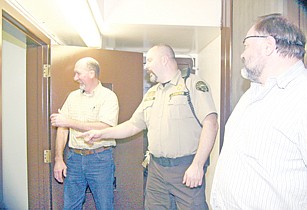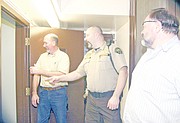Commissioners to consider fuel purchase
Libby Airport had a problem keeping enough fuel on hand to satisfy all the aviators who came through.
But that problem was solved temporarily by Stinger Welding CEO Carl Douglas.
Douglas, who was killed last month in a plane crash as he attempted to reach Libby in a snowstorm, had purchased and stored fuel at the airport so it would be ready. Douglas also allowed other pilots to purchase fuel, which benefited and added commerce to the airport.
“Without fuel, we’re just not going to get that many people to fly in,” Airport Board Chairman Ron Denowh told Lincoln County Commissioners on Wednesday.
Denowh was contacted by Stinger Vice President Steve Patrick asking for payment for the remaining fuel at the airport, saying the request is coming from Stephanie Jordan, Douglas’ widow.
“We had a handshake agreement, he and I,” Denowh said of Douglas. “Carl helped us overcome the stigma of not having fuel at the airport. That’s important, having fuel, and Carl helped with that.”
Denowh explained Jordan now wants to be repaid for the remaining unsold fuel at the airport.
“She wants to get out from under this,” Denowh said of Jordan and the attachment to the balance of aircraft fuel.
Denowh explained to commissioners it is his desire to keep about 5,000 to 6,000 gallons of fuel at the airport in the 12,000-gallon tanks. Denowh said Douglas made sure there were both Jet-A and 100-LL fuel on the premises. The cost, of fuel is about $4 a gallon and the airport currently sells it for about $5.65 a gallon.
Ideally, the initial cost of the fuel, which is delivered by truck, would be between $50,000 and $60,000.
“It’s not like we were making $1.65 on every gallon,” Denowh said. “There was a credit-card (reader) that costs $80 a month and a phone line.
Denowh asked commissioners for what amounts to a check to pay off Jordan for the unused fuel and establish a contract for purchasing more fuel.
“We cannot operate without fuel,” Denowh said. “So, we need to come up with something.”
Libby Commissioner Tony Berget expressed hesitation about purchasing fuel for the airport.
“I don’t think the county wants to get in the fuel business,” Berget said. “I think we need to see a plan with a payback period.”
Denowh agreed to write a plan that would include reimbursement to the county as the fuel is sold.
It is Denowh’s contention if it is known to pilots that fuel is available at the airport, it will increase traffic.
“We have people calling now trying to find out if fuel is available.
Denowh mentioned possible consumers of fuel would be the U.S. Forest Service, which used the airfield during the summer fire season.
Douglas, 54, and his passenger, John Smith, 43, were killed shortly after midnight Dec. 19 when the Beechcraft King Air 100 Douglas was piloting crashed into Swede Mountain.
A preliminary report by the National Transportation Safety Board indicated, Douglas, who had a student’s pilot’s license, hit at least two trees before slamming into Swede Mountain at 12:02 a.m.
The NTSB prelininary report confirmed what The Western News reported its Jan. 1 edition that Dougla was only a student pilot.
The men were flying from Arizona to Libby for a meeting at Douglas’ company, Stinger Welding. When Douglas did not appear at a company function, employees there reported him overdue.
Under FAA rules, a student pilot may not carry passengers, may not fly for hire or in furtherance of a business and may only fly under visual flight rules.
The final NTSB report is expected to take months to complete.



